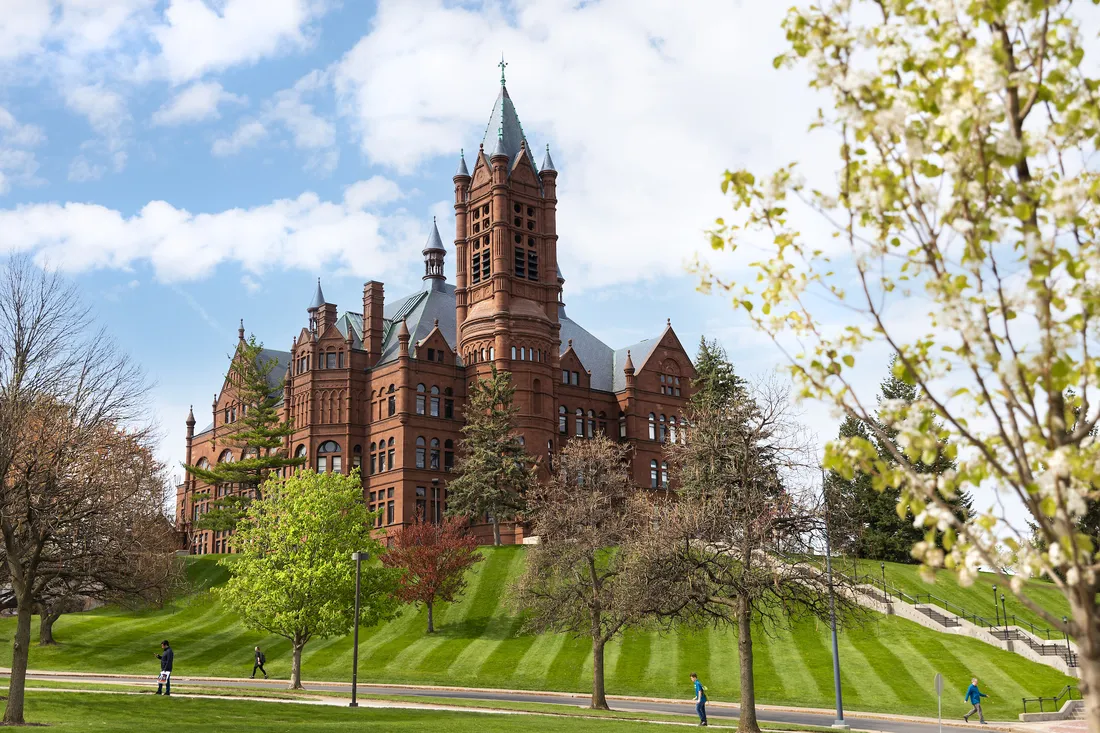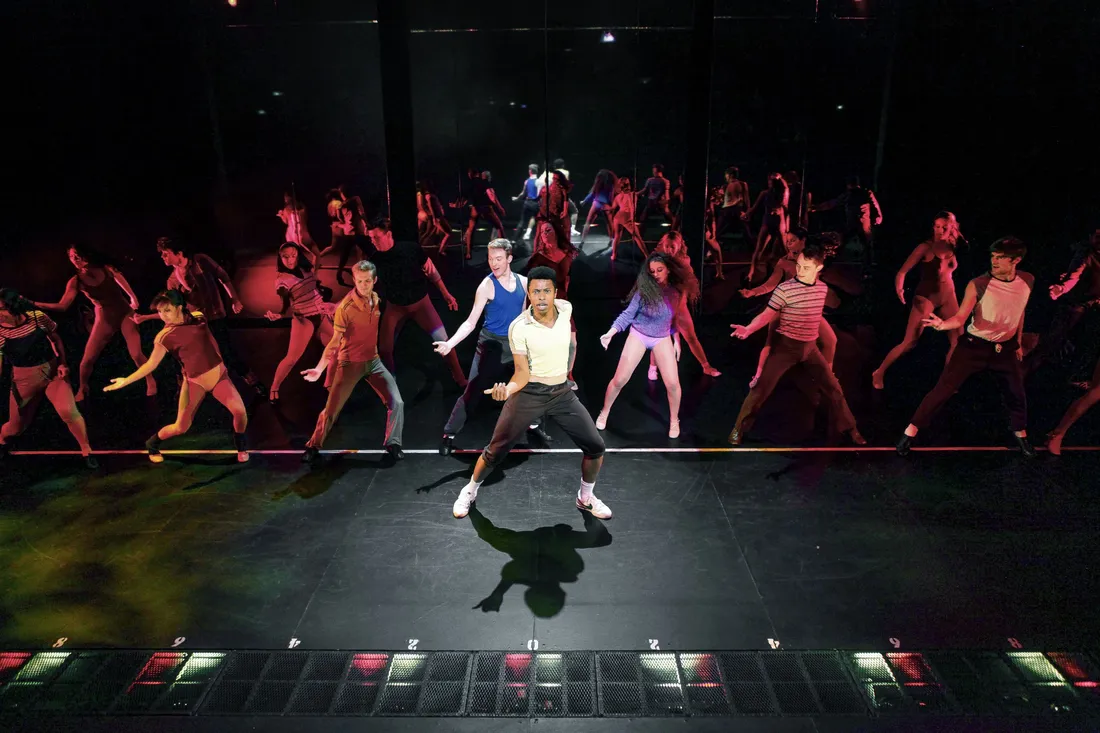It begins with a dance party. Syracuse University Department of Drama students get energized for the day’s theater workshop alongside members of the Syracuse community who have disabilities and have come to share their talent.
It’s part of the All Star C.A.S.T. (Community Actors & Students’ Theater) program in the College of Visual and Performing Arts in which Syracuse students act as facilitators of a multi-arts performance to take place at the end of the semester, working with Syracuse community members who perform in the show.
“It’s all about co-creation,” says Kathryn Fathers, the faculty advisor who guides the students and oversees the workshops. “We don’t come with anything fixed to start with, so everyone can participate in thinking about the design, the production, the direction and the performances.”
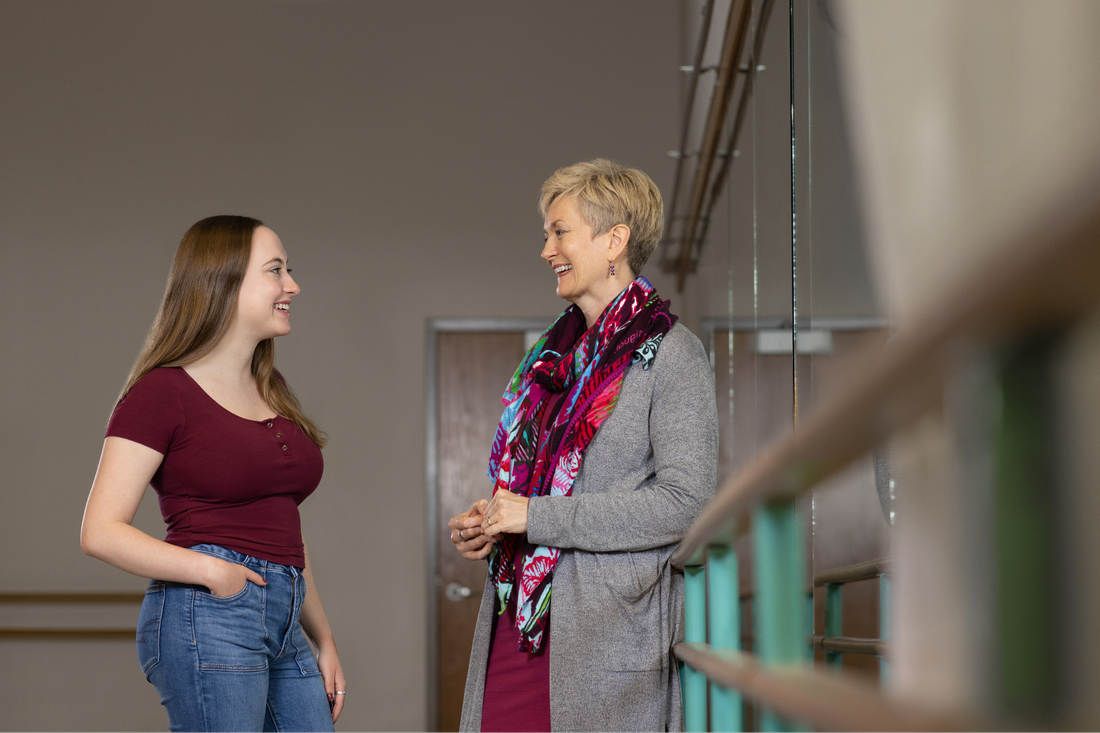
Kathryn Fathers (right) facilitates important discussions about disabilities studies with students including Savannah Devlin ’23 (left).
The dance party is followed by a series of physical, vocal and mindful warmups. In smaller groups, the actors do improv, an activity or an exercise that maps to the theme of the show.
Fathers, a board-certified music therapist and licensed creative arts therapist and the director of CNY Music Therapy, says the program is transformative for the students. “Making relationships through the creative arts is such a huge gift. You are hearing people’s creative ideas and sharing one another’s stories. All Star C.A.S.T. provides a beautiful connection that sparks new ideas, and it’s a celebration of everyone’s abilities.”
All Star C.A.S.T. is a class that addresses deep change and awareness for students. It’s experiential learning—to grow in listening and self-reflective skills and to acknowledge their own privilege.
Professor Kathryn Fathers
At the beginning of the semester, Fathers first meets with the students for two weeks to discuss important topics, including disability studies, inclusive language and addressing privilege and bias. “We ask, ‘What does privilege look like in this situation with people who have learning disabilities?’” says Fathers. “This can often mean taking over, or colonizing, someone’s ideas, or leaving some voices unheard because they were not given space to fully contribute. We’re always trying to become more aware so that we can become better, and more responsive, listeners.”
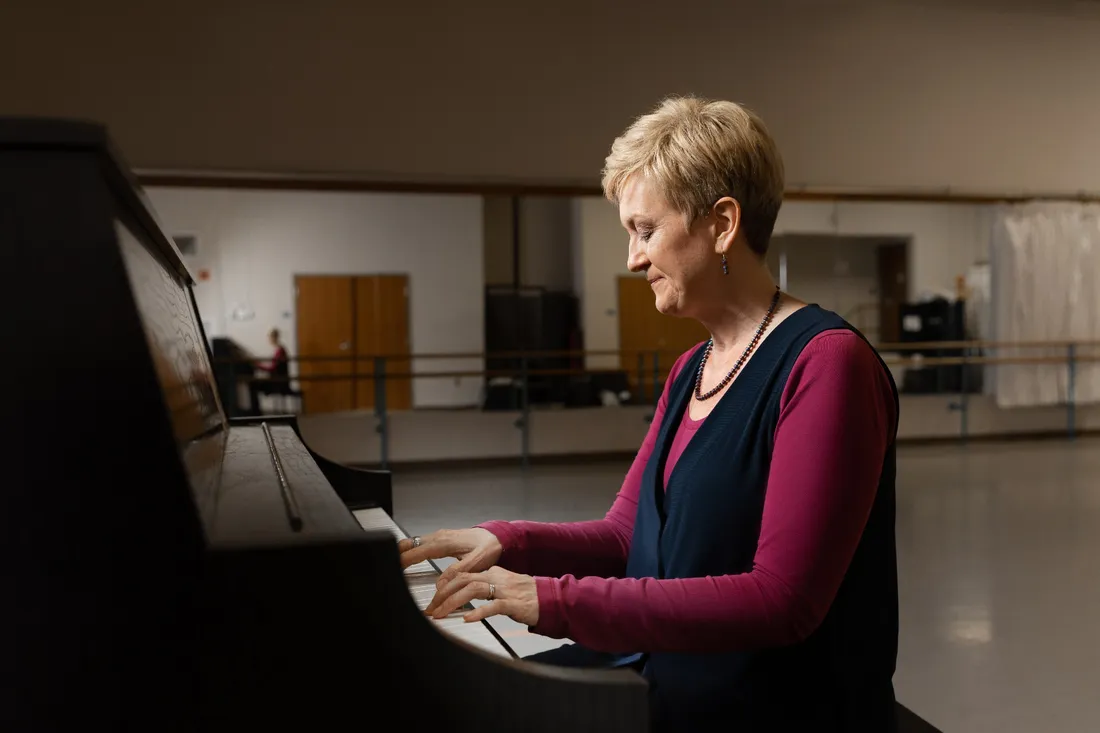
Kathryn Fathers says All Star C.A.S.T. fosters co-creation in a truly nonjudgmental space.
Fathers says it can be uncomfortable for the students to not take control of the creative process while learning to lead a workshop, and it is especially beneficial for the acting majors to take on a behind-the-scenes role. “The students grow in their sense of confidence and their sense of self. By the end, all the students are invested in the success of every actor. I tell them, ‘Notice where the spotlight is focused. How can we give that spotlight away for the community actors to enter it and bring their strengths?’ We work on holding equitable space for all of us to co-create.”
Growing in Leadership
Junior acting major Savannah Devlin ’23 found tremendous value as a student facilitator in the All Star C.A.S.T. program. “Professional theater and acting are very competitive, and I’m used to perfection—everyone needs to be on their mark, and it has to look like a cohesive, well-oiled machine every time,” she says. “The first time I participated in All Star C.A.S.T., I was struck that perfection is not the only definition of success and good, creative art.”
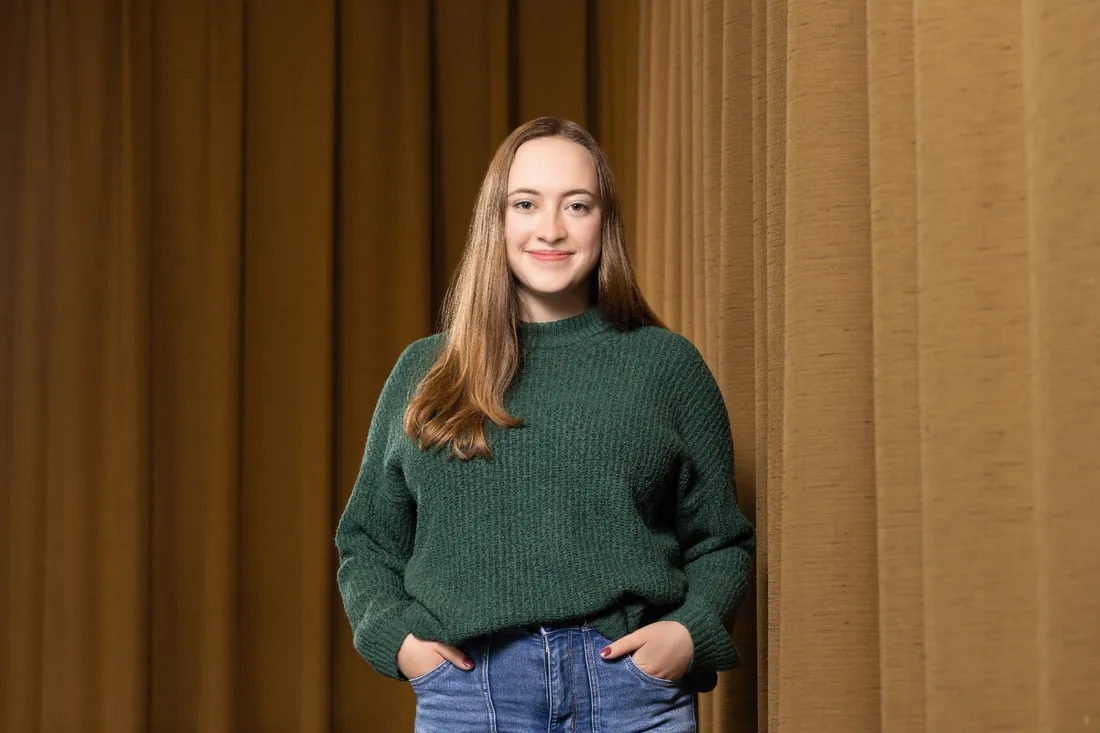
Savannah Devlin ’23 has participated in All Star C.A.S.T. for four semesters.
After her first year with the program, Devlin repeated the class for three additional semesters. “I wanted to continue seeing the growth of the community actors,” she says. “I really valued the hands-on experience in the class. There’s a lot to learn about taking on a leadership role that won’t stifle other’s ideas or creativity. That’s a learning process that can take years, so I didn’t want to lose that momentum. I wanted to keep learning and keep having that rewarding experience.”
Devlin has also enjoyed facilitating the workshops with her fellow drama students. “We talk about different strategies and have a lot of adaptations that we use in our exercises to make them accessible for everyone.” Some of the techniques the students use include slowing things down, pausing in the middle of an activity to reassess, using non-language-based communication, and using music or your body to show how you’re feeling.
Another thing she’s taken away from the program is the importance of giving people space to be themselves. “I’ve grown as a leader in doing this class, because I now understand that co-creating is more important than leading. It’s about being present with people and allowing them space to grow. It’s made me more well-rounded and a better listener and communicator.”
Devlin credits the Department of Drama for broadening her vision of what’s possible. “A lot of the acting program is about finding who you are as an artist and what interests you in the theater industry. I feel like I’ve been given the space and the opportunity to explore those different aspects of this art form and new educational opportunities. I’ve been allowed to take ownership of what I want to do in the world.”
After graduation next spring, Devlin is interested in directing theater and is also considering pursuing a graduate degree in drama therapy. “I have a much more open mind about what I can do than when I came to Syracuse University, and that’s really going to prepare me to join the industry and use all of my skills to succeed.”
I’ve grown as a leader in doing this class, because I now understand that co-creating is more important than leading. It’s about being present with people and allowing them space to grow. It’s made me more well-rounded and a better listener and communicator.
Savannah Devlin ’23
Giving Back to the Community
William Schuyler ’22 graduated this spring with a bachelor’s in acting. “The Department of Drama has given me real-world experiences that have helped me in every aspect of my life,” he says. “I apply what I’ve learned to my personal creative projects on a daily basis.”
Schuyler spent several summers in high school working at a camp that serves children with disabilities and was drawn to All Star C.A.S.T. for the opportunity to work with members of the Syracuse community. “When I joined, I was hoping that I would feel I had leveraged my privilege as a student at Syracuse University to somehow give back to the larger community,” he says. He valued the relationships he made with the actors, and he decided to participate for a second semester.
Schuyler says the experience in the All Star C.A.S.T. program had a great impact on him. “I realized through this program and my reflection afterward that I was someone who sometimes put productivity before teamwork. While part of our goal as facilitators is to provide guidance, it is very important to see the community actors as equal collaborators in the creation of the final theater piece.”
I attribute my current success as a collaborator to skills I improved while working as a facilitator in the All Star C.A.S.T. program.
William Schuyler ’22
He adds that it was rewarding to collaborate with community members who were experiencing the joy of theater. “Some of my favorite All Star memories were the discussions I had with the individual actors one-on-one. I loved getting to know each actor’s personality, abilities and interests. I really value those relationships.”
Schuyler received an undergraduate research grant from the Syracuse Office of Undergraduate Research and Creative Engagement (SOURCE) during the summer of 2020, which he used to produce Shakespeare’s Twelfth Night in his hometown and to launch his own community theater, the Blue Ridge Young Actors Guild. This past semester, he studied at the University’s Fisher Center in New York City as part of the Tepper Semester. He hopes to begin working as an actor or in theater management, taking with him the skills he gained through the All Star C.A.S.T. program. “Participating in All Star has given me new perspectives that will help me in the future,” he says. “I attribute my current success as a collaborator to skills I improved while working as a facilitator in the All Star C.A.S.T. program.”
A Learning Experience
All Star C.A.S.T. is an incredible opportunity to find what it is to be truly open to others. “The actors are the ones that are teaching with students from day one,” Fathers says. “They have this supportive relationship with one another that’s a lot of fun. It’s a huge impact for students to experience what a nonjudgmental space means. My hope is that they will go out and be creators of those spaces themselves.”
Besides the significant skills the students gain that can be applied to theater workshopping or any group work contexts, the impact of the program far exceeds the academic.
“All Star C.A.S.T. is a class that addresses deep change and awareness for students,” Fathers says. “It’s experiential learning—to grow in listening and self-reflective skills and to acknowledge their own privilege. They come into this class, and they’re immediately experiencing themselves in a new way alongside people who are different to them, and they are encouraged to grow in understanding the many dynamics that go with that—it’s incredibly valuable.”

